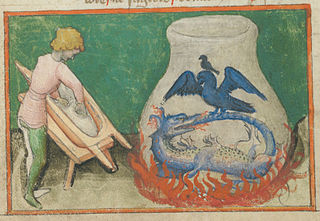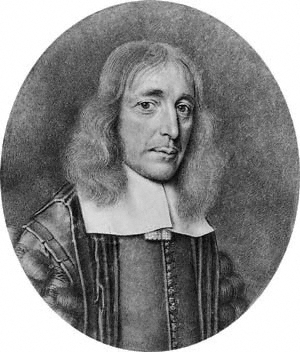Related Research Articles

Alchemy is an ancient branch of natural philosophy, a philosophical and protoscientific tradition that was historically practised in China, India, the Muslim world, and Europe. In its Western form, alchemy is first attested in a number of pseudepigraphical texts written in Greco-Roman Egypt during the first few centuries AD.

Sir Thomas Browne was an English polymath and author of varied works which reveal his wide learning in diverse fields including science and medicine, religion and the esoteric. His writings display a deep curiosity towards the natural world, influenced by the Scientific Revolution of Baconian enquiry and are permeated by references to Classical and Biblical sources as well as the idiosyncrasies of his own personality. Although often described as suffused with melancholia, Browne's writings are also characterised by wit and subtle humour, while his literary style is varied, according to genre, resulting in a rich, unique prose which ranges from rough notebook observations to polished Baroque eloquence.
The year 1866 in science and technology involved some significant events, listed below.
The year 1840 in science and technology involved some significant events, listed below.
The year 1803 in science and technology involved some significant events.
The year 1865 in science and technology involved some significant events, listed below.

Michael Sendivogius was a Polish alchemist, philosopher, and medical doctor. A pioneer of chemistry, he developed ways of purification and creation of various acids, metals and other chemical compounds. He discovered that air is not a single substance and contains a life-giving substance—later called oxygen—170 years before Scheele's discovery of the element. He correctly identified this "food of life" with the gas given off by heating nitre (saltpetre). This substance, the "central nitre", had a central position in Sendivogius' schema of the universe.

Michael Maier was a German physician and counsellor to Rudolf II Habsburg. He was a learned alchemist, epigramist, and amateur composer.

Thomas Beddoes was an English physician and scientific writer. He was born in Shifnal, Shropshire and died in Bristol fifteen years after opening his medical practice there. He was a reforming practitioner and teacher of medicine, and an associate of leading scientific figures. He worked to treat tuberculosis.
Thomas Vaughan was a Welsh clergyman, philosopher, and alchemist, who wrote in English. He is now remembered for his work in the field of natural magic. He also published under the pseudonym Eugenius Philalethes.
John French (1616–1657) was an English physician known for his contributions to chemistry as well as for his English translations of Latin and German works.

Thomas Willis FRS was an English physician who played an important part in the history of anatomy, neurology and psychiatry, and was a founding member of the Royal Society.
Eric John Holmyard was an English science teacher at Clifton College, and historian of science and technology.

This timeline of chemistry lists important works, discoveries, ideas, inventions, and experiments that significantly changed humanity's understanding of the modern science known as chemistry, defined as the scientific study of the composition of matter and of its interactions.
Events from the year 1699 in England.

John Bostock, Jr. FRS was an English physician, scientist and geologist from Liverpool.
Edmund Dickinson or Dickenson (1624–1707) was an English royal physician and alchemist, author of a syncretic philosophical system.
The year 1566 in science and technology included many events, some of which are listed here.
Thomas Coxe (1615–1685) was an English physician. He studied at Emmanuel College, Cambridge, graduating with a BA in 1635 and an MA in 1638. He was among the initial fellows of the Royal Society, but ran into money difficulties in old age.
John FergusonFRSE LLD was a Scottish chemist and bibliographer. He is noted for the early alchemy and chemistry bibliography Bibliotheca chemica. He was generally nicknamed Soda Ferguson. The Ferguson Collection, a collection of 7,500 books and manuscripts from his personal library is held by the University of Glasgow.
References
- ↑ "chemistry, n". Oxford English Dictionary online version. Oxford University Press. September 2011. Retrieved 2011-11-02.(subscription or participating institution membership required)
- ↑ "Sedziwój, Michal". infopoland: Poland on the Web. University at Buffalo. Archived from the original on 2006-09-02. Retrieved 2007-02-22.